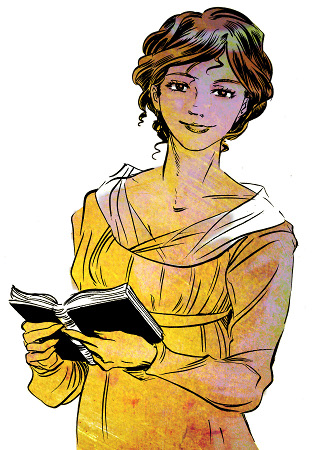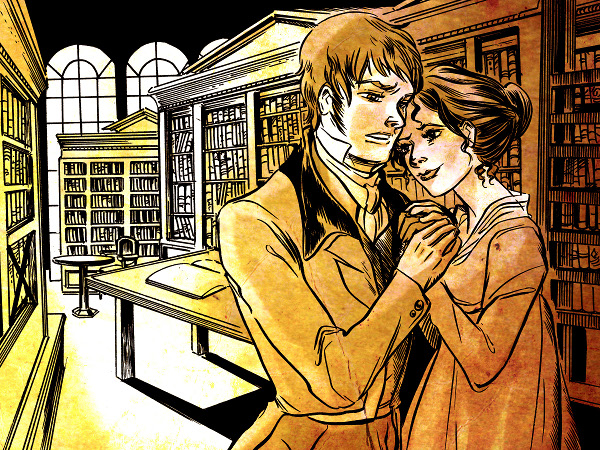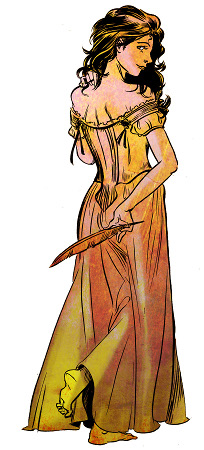This Wicked Gift Enhanced Content
The enhanced content for This Wicked Gift is Q&A, some hand-illustrations, and an audio clip.



Before this novella was first published in late 2009, I wanted to do a book trailer. In preparation for that, I commissioned a number of images to use in that trailer.
But I never liked the voiceover I obtained, the video never worked properly, and eventually I ran out of time and gave up on the idea. The illustrator, Tintin Pantoja, graciously allowed me to use these images in the enhanced edition of the work. This is the first image I commissioned: a picture of the street where Lavinia lives.
The second one of Tintin’s images: Lavinia looking up from reading a book.

Q. Lavinia and William have very different ways of reacting to poverty. Do you feel that is owed entirely to the fact that William began life well off, or is it also a result of the different expectations that they would have based on gender (i.e. William would be expected to earn an acceptable income, whereas Lavinia’s focus would presumably be on finding a husband who earned an acceptable income)?
A. This is entirely because William was raised middle class. Lavinia has always been at a certain social status, and so she doesn’t really know what she’s missing. She’s used to the things she has; she doesn’t miss having new dresses and fancy food. William does.
But there’s also a certain amount of naivety at play here, too. Lavinia has never lost anything, and so she can’t imagine what loss feels like. William has, and he knows that what he has now, he might lose again. Even though Lavinia has a lot of financial burdens, she also has a support system—her father and brother—and (although it’s only hinted at in the book) a neighborhood community that is invested in her family and their success. She can’t even truly imagine what it would be like to lose that.
Lavinia has never been hurt the way William has, and she doesn’t know that she should flinch from it.
Audio Transcript
I got the idea for this book by reading another book – that happens a lot. I don’t remember which book it was, but I do remember that the heroine in that book agreed to be the hero’s mistress because her 17 year old brother had racked up massive gambling debts, and the hero was threatening to send him to debtors’ prison. And I read this and I said “She doesn’t need to be his mistress – she needs a lawyer.” You would be surprised how many times I say that. So I had this idea for a book, where the hero tried to pull that stupid crap, and the heroine called him out on it. And that is This Wicked Gift.
Q. William tries, and fails, to coerce Lavinia. Was it difficult to navigate the moral implications of the situation given that William needed to remain a likable and redeemable romantic hero?
A. This is a hard question to answer. When I wrote this novella I don’t know that I truly grappled with all the moral implications that were raised by the scenario. It sounds ridiculous, but questions of consent are not often dealt with by romance novels, and so it did not occur to me to think them through as carefully as I could have. I don’t think this is a bad story—in fact, I rather liked it, for many reasons, and many other readers did as well. But the author I am today, in 2014, would not have written the novella I wrote that was released in 2009.
One of the things that I was trying to do with this novella (and whether I was successful at it, is up to the reader to judge) was to flip the gendered experience of sexual intercourse.
In the usual way of historicals, the woman experiences pain due to the loss of her virginity, and may not feel any pleasure at all during the act. She feels all the consequences of social expectation, all the worry that if her choice is uncovered, she’ll be ruined. To the degree that she’s internalized societal belief, she may even feel dirty. The woman holds all the burden of sex: emotional, financial, social, and when the transaction is complete, she’s the one who has fallen.
Here, William is the one who feels out of his depth. He can’t truly take any pleasure in the intercourse, and he’s the one who worries that he’s ruined himself. He’s the one who is worried about pregnancy, about the social impact. He’s the one who feels dirty as a result, and he’s the one who has to redeem himself.
For Lavinia, love and sex are uncomplicated and simple. He wants her; she wants him.


Q. Why did you choose to write a Christmas story that avoids most of the trappings of a Regency Christmas?
A. There are no kissing boughs or trips to the forest to get mistletoe in This Wicked Gift. I asked a handful of friends to read the original version for me, and the one thing they universally said was “NEEDS MOAR CHRISTMAS!”
So I added in a little music and the scents of Christmas pastry.
The one thing I slipped in there to try and give it a Christmas-y feel was repeated references to the libretto from Handel’s Messiah—something that my parents would play as soon as our Christmas tree went up, and one of my strongest associations with the Christmas season.
I was trying to be subtle about it, but apparently I was a little too subtle, because now I can’t find all the references. The only one I can say for sure is a Messiah-reference is this:
“You?” The solicitor laughed in scorn. “Well, trust in yourself, then. You’ll not deliver yourself from poverty.”
Which is a reference to:
“All they that see him laugh him to scorn: they shoot out their lips, they shake their heads, saying: He trusted in God that he would deliver him: let him deliver him, if he delight in him.”
—Handel’s Messiah, No. 27
Yeah, that one was probably a little too oblique. What can I say? I was a relatively new author. I thought I was being clever. Woooo. Look at me, making literary allusions that even I can’t catch.
Q. The value of love versus more material things is a pretty classic Christmas theme. Did you conceive of a hero and heroine so mired in questions of poverty and wealth specifically for that purpose or did it take shape later on?
A. I had planned to write this story before my publisher asked me to do it. I had intended it to be a free short story to promote the release of my first book. I hadn’t imagined it as a Christmas book at all.
So the line in the book about the best things being free was there as a sort of a subtle nod to what I had planned—that the story would be free, and that you could get good things (I hoped the story would be good) at no cost. That line—and the inkling of the plot—arose from the distinction between the things that were available for purchase (when the characters had no money) and the things you could get for free.
Then Harlequin asked me to participate in the anthology and told me, oh, by the way, it’s a Christmas story. So the Christmas-theme aspects of it were not initially intended by me.
Q. William spends a lot of the story considering himself morally bankrupt as a reaction to his station in life. In the end, when he has decided to value his own honor, he happens into a way to raise his station in life. Was this intended to be a karmic thing, or was it just coincidence resulting from the necessary resolution of the story?
A. I never intend karmic things. That would imply that people (generally) get what they deserve, and unfortunately, they don’t. The world is an awful place.
This was actually more a question of necessity: the story, even though it was published before Proof by Seduction, was written afterwards. I had been directed to write something that would be a prequel tie-in, and there was literally only one couple who was married and appeared (well, at least half of them appeared) in Proof by Seduction.
So I knew I needed Gareth in the story of This Wicked Gift, and I knew I wanted to end the story with William White working for Gareth. This was how I managed it.
The Carhart Series Reading Order
...or get all three books in one boxed set.
